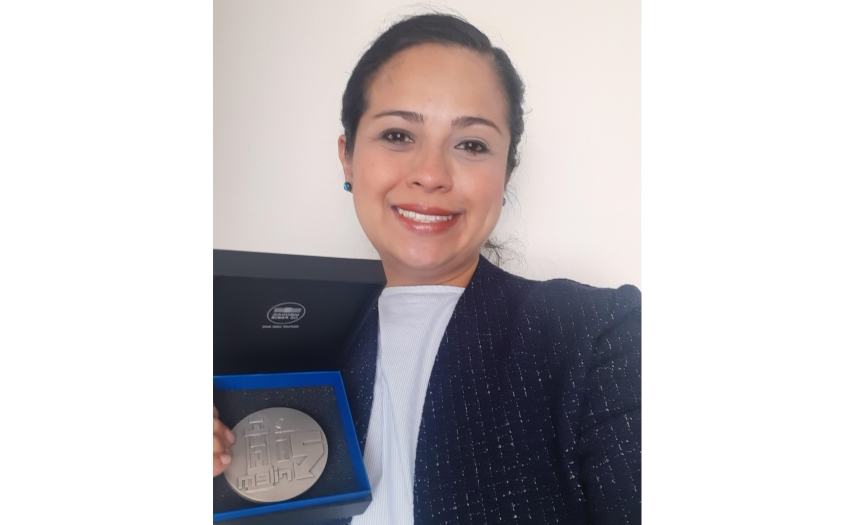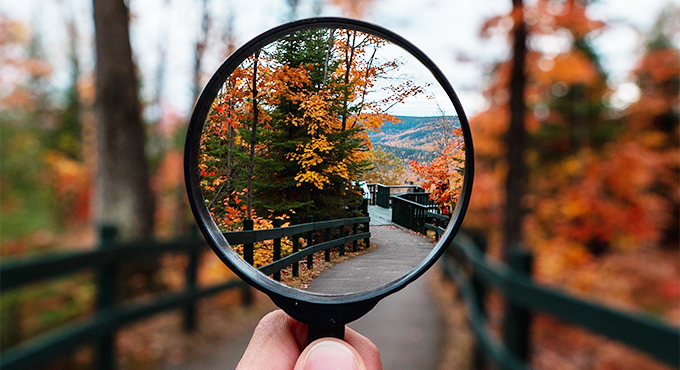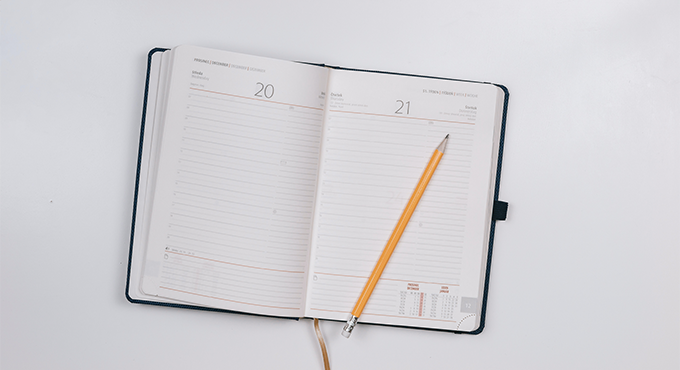News

Interview with 2022 R. L'Hermite medallist, Dr Susan A. Bernal Lopez
Dr Susan Andrea Bernal Lopez is currently Full Professor in Structural Materials at the University of Leeds (UK), where she is Director of the Materials & Structures Group. Prof. Bernal is the recipient of the 2022 Robert L’Hermite medal, in recognition of the impact of her research activity on assessment and improvement of durability and sustainability of novel cements and concretes, as well as waste management and valorisation. She has been very active in RILEM, participating in 8 TCs and serving as Deputy-Chair of one of them (TC 281-CCC Carbonation of concrete with supplementary cementitious materials), as well as being Associate Editor of RILEM Technical Letters since 2016. She was awarded one of the RILEM Gustavo Colonnetti medals 2016 for her previous work on alkali activated materials.
30 June 2022
RILEM Implementation Manager (RIM): Good morning, Susan! In preparation to this interview, I had a look at the video of your presentation at the 2016 RILEM Colonnetti medal ceremony, in which you talk about your early career in RILEM and your work on Alkali Activated Materials. Very interesting! It was the first year the Colonnetti medals were awarded, and I heard it was a very competitive process.
Prof. Susan Bernal Lopez (Susan): Good morning, Daniela! I applied for the 2016 Colonnetti medal encouraged by many RILEM senior members. I confess that at that time I didn’t think I was competitive enough for that medal. I was in a point of my life when I questioned myself about my career choices; I was wondering “should I continue in academia?”, “should I try to pursue a career in industry?”. That was the time when I was expecting my son and my priorities were shifting. Getting that medal was an important milestone in my career, as it gave me that boost of energy, super boost of confidence in myself and the things I was trying to achieve with my research. I am very grateful for the recognition to my research efforts, but more grateful for the personal impact that it had in me because it really motivated me to be more ambitious with what I want to accomplish in terms of research, ambitious in becoming truly independent as a researcher, and ambitious in applying for a very competitive scheme in the UK, which is the EPSRC Early-Career fellowship that gave me 5 years funding to build my own research team and to materialise my research vision.
RIM: If I have a look at your CV, your achievements, it is hard to believe that you had doubts. I somehow struggle to believe it.
Susan: I think this has a well defined name: imposter syndrome. I am a very emotional person, I used to take things very personal, and also academia in not for everyone. You put your best work and your best ideas out there to be scrutinised, criticized…
RIM: … crucified!
Susan: yes! And you also need to learn about how to handle rejection. At that point in my career, I was a post-doctoral researcher, I hadn’t secured a permanent job but I had accomplished quite a lot for that career stage. When I received the medal, I just got my first tenure-track position. I was thinking “goodness me, if after all I have done, the grants I received and the international recognition I enjoy, and I still cannot secure a permanent job that fulfils me, what is going to happen in the next years? What else do I need to do?”. On top of that, when you are expecting a child, it is a vulnerable period for everyone because you know it will be transformative. So, you wonder “ok, if now that I work a certain number of hours a week, travel the world, do all the right things and this is where I am; how am I going to do this when I am not going to dedicate the same time and energy?”. That’s why the medal was so important: because it was a recognition by the research community that I was doing the right thing, and doing it well.
RIM: Six years ago, you were asking yourself “how am I going to cope as a mother with a job in which you travel a lot and you work 24/7?”. The question is, six years later: how are you coping now?
Susan: I would say that the first step was recognising that that was going to be the case. In my case, I accepted it! I needed to evaluate my priorities and find a balance between my personal and professional responsibilities. For me, my priorities are extremely clear, and this helps me to cope. I always think that I have 35-40 years of career ahead of me (fingers crossed) and that any challenging situation is temporarily. If I cannot go to all the conferences, write all the papers I want to, it is ok. There will be a time later in my life to do so. In my personal case, what is really helping me, is: 1) an extraordinary support system, as I am very fortunate that my husband is extremely supportive with my career as well as my close and extended family, and 2) RILEM, as it has had a tremendous positive impact. I have really felt the support of this lovely community over the past 6 years. As evidence of that, if you look for instance at my publications track record, the majority of publications I have produced over the last 6 years, are collaborative research linked to the several RILEM technical committees I contribute to.
RIM: It is the network that supports and stimulates you.
Susan: Exactly! At the same time, I had to choose very wisely which conference to attend, how to invest my time and I always prioritise RILEM events and technical committee’s activities. To me, as I said before, going to a Spring Convention or Annual Week, Technical committees meetings is a must, as long as time permits.
RIM: Can I share in this interview that your husband is Prof. John Provis, Sheffield University, Chief Editor of Materials and Structures, 2020 RILEM Honorary President and 2021 RILEM fellow?
Susan: It is fine! Well, everyone knows; for example, in John’s paper for his 2013 Robert L’Hermite medal (Editor’s note: Provis, J.L. Geopolymers and other alkali activated materials: why, how, and what?. Mater Struct 47, 11–25 (2014)), in his acknowledgments, he dedicates the medal to me!
RIM: So… it is public domain! Moving on, there is something else to mention, that is the fact you set up a Technical Committee (Editor’s note: 281-CCC : Carbonation of concrete with supplementary cementitious materials) in 2017, right after the year of your Colonnetti medal. Being a mother, securing a tenure position… it was a big commitment from you all at the same time!
Susan: I think several factors contributed to give me the confidence to do this. The first one was the support of Nele (Editor’s note: Nele De Belie, TC 281-CCC Chair): Nele is a very accomplished, very senior female academic, also a mother. That was a boost of confidence: we can do it together! TC 281-CCC was also somehow the natural continuation of TC 238-SCM : Hydration and microstructure of concrete with supplementary cementitious materials, that Nele chaired and of which I was a member. Some members of TC 224-AAM : Alkali activated materials also joined in, so at the beginning it was not a lot of work, as it was a group of around 40 people that pretty much knew each other. Afterwards, I got this EPSRC fellowship, which has allowed me to dedicate most of my time to research activities. This fellowship gives me the time and space to be able to do all different professional activities I would like to develop.
RIM: When you received the Colonnetti medal, did you have in mind already to apply for the L’Hermite medal a couple of years later?
Susan: To be honest, 5 years ago if anyone asked me “where are you going to be in 5 years’ time?” I could not have dreamed to be where I am today. Over the past years, it has been an opportunity after the other that helped me to build a very strong team and research track record. I will never forget seeing the talk of many L’Hermite medallists in the past with great admiration. I never thought I could be one day amongst them.
RIM: But then it happened!
Susan: It happened! But I actually applied for the first time a couple of years ago, and I didn’t get it. To be honest, maybe because it was during the COVID period and it was a challenging time for everyone, it really hit me badly. I thought “I should have never applied”. I was not going to apply for this medal again.
RIM: You took this rejection at a personal level.
Susan: Yes, I thought at that time it was a long shot, too ambitious. I had then a conversation with a couple of very senior RILEM members, and I got some feedback on my application. They were very encouraging: “come on, you are extremely young” because at the time when I applied I was 37 years old (Editor’s note: the L’Hermite Medal is awarded to a researcher under 40 years of age). Considering the extension for maternity leave, I had 4-5 years of time to apply again and in the meantime accomplish the things that are expected for such award. So, I took a break from thinking about re-applying for the medal, but then this year I was again encouraged to apply and so I did it. This medal means a lot. Firstly, because it is something that I thought I was never going to accomplish; I also feel so much admiration for the people who have received this medal before me, that it is a tremendous honour to have it. Secondly, because I have always been a RILEM member, from my time as junior post-doc to professor; to get this recognition is quite special.
RIM: What did you do when you received the email with the announcement of the medal? How many glasses of champagne did you drink?
Susan: Well, I cried. I was so overwhelmed. I couldn’t believe it, quite frankly. From the moment I got the medal until today, I had a few months to reflect about what it actually means to me and the impact it will have in the longer term in my career. It gave me lots of joy, I felt honoured, but also it made me reflect about the fact that I am one of the few women that have got the medal, I am the only Latin-American female academic that has got this recognition, and this is somehow sad. On this regard, I received so many messages from people I have never met when I got the medal, especially through LinkedIn, mostly saying how seeing me there, or someone like them achieving such an award, meant a lot! For me it is a great responsibility to live up with the expectations that will be created with the recognition.
RIM: Let’s talk about your research now. Have you decided the title of your L’Hermite medal presentation at the 76th RILEM Annual Week in September?
Susan: Well, I will centre my talk and paper (Editor’s note: every year the RILEM L’Hermite medallist is invited to submit a paper to Materials and Structures) on the key role of durability and longevity of concrete in sustainability. I work in many different aspects of decarbonization of cement and concrete, but one of the things that has defined my career is my work on carbonation of concrete, on the threats concrete suffers from during its service life. Making a structure last longer means using less resources, but also repurposing our infrastructure rather than demolishing and building something new. This is absolutely strategic for many of the new initiatives in terms of decarbonization of the infrastructure sector. I anticipate that my presentation will not be very technical, as it will not try to showcase what I am capable of (I think the award says it by itself), but I will try to send a message that gets to as many people as possible. There might also be a personal message about what this award means to me as an individual, as a woman, as a mother. I think it is time to bring on the stage this type of discussion about gender balance and how organisations such as RILEM play a key role in opening opportunities and supporting the next generation of academics and researchers.
RIM: I look forward to seeing your presentation in September and watch it also on YouTube, Susan! Thank you so much!














No comment
Log in to post comment. Log in.